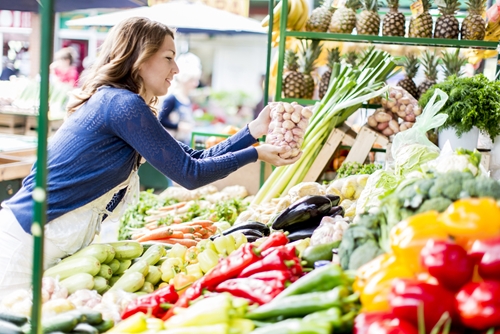Going green has been doctors' diet advice for decades. Spinach, apples, broccoli – all sorts of fruits and vegetables that are wonderful for you may also be great for the environment. Here's how:
What is Sustainable Food?
Sustainable food is a way of growing, raising and consuming food in an ecologically and ethically responsible manner using practices that protect the environment. It provides fair treatment to workers, humane treatment to farm animals and decreased exposure to harmful substances such as pesticides, antibiotic-resistant bacteria and unhealthy food additives.
All of these measures factor into living in a sustainable world. Generally, the most sustainable food producers are family farmers and family-owned businesses that have a personal connection with the land they work on.
Why Eat Sustainable Food?
Not only is eco-friendly food better for the farmer's side of the equation, it provides a number of health benefits for you. Consuming sustainably grown, unprocessed (or minimally processed) foods such as whole grains, legumes, and fresh fruits and vegetables is known to decrease cholesterol levels, reduce the risk of certain cancers and improve digestive function.
According to the Harvard School of Public Health, eating foods produced locally has "distinct advantages." The paper highlights that foods grown far away spend a significant amount of time on the road, and thus have more time to lose nutrients before arriving in the marketplace. On the other side of the spectrum, produce sold within 24 hours is at peak freshness and ripeness, making it a great choice.
"Second, farmers growing for a local (and especially a direct) market favor taste, nutrition and diversity over shipability when choosing varieties," the author Kathleen Frith wrote in the white paper. "Greater crop diversity from the farmer means greater nutritional diversity for the eater."
The takeaway? Often, local is more nutritious!
Where to Buy?
You can shop for sustainable food at farmers markets, food-buying clubs, community-supported agriculture (CSA) and other places. When you become a member of a CSA, you can purchase a share of vegetables from a regional farmer. Other farmer-run options include farm stands and "pick your own" farms.
If you shop at a large, chain supermarket and want to find sustainable foods, simply ask. When signs aren't posted to label food from organic or local farm food, ask the store manager to start labeling produce. You can ask the manager of the meat department if any of the meats sold are organic and/or sustainably raised.
To get your own produce, consider gardening yourself. Whether you have a backyard, urban rooftop or community garden, gardening is as local as it gets.
As a consumer, you play a big role in determining the health of the environment. Sustainable food has an array of benefits for the environment, and sells nutritious food with a delicious taste. In other words, sustainable food is a great chance to start celebrating local, seasonal and artisanal ingredients by purchasing fresh produce directly farmers close to your communities.
